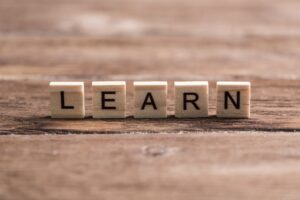
Good writing and content development are challenging for most. Even the most experienced writers seek inspiration from experts, their peers, and other sources. From grammar to creative writing to marketing and advertising advice, these books on writing provide valuable insights into what it means to be (and grow as) a writer.
Valuable Guides
Associated Press Stylebook by The Associated Press
“The style of The Associated Press is the gold standard for news writing. With the AP Stylebook in hand, you can learn how to write and edit with the clarity and professionalism for which their writers and editors are famous.”
—Publisher
The Elements of Style by E. B. White
“Buy it, study it, enjoy it. It’s as timeless as a book can be in our age of volubility.”
―The New York Times
Writing Tools—50 Essential Strategies for Every Writer by Roy Peter Clark
“No matter what you write—a blog, a love letter, the next great American novel—Writing Tools offers practical advice that is a pleasure to read.”
―St. Petersburg Times
Eats, Shoots & Leaves: The Zero Tolerance Approach to Punctuation by Lynne Truss
“This book changed my life in small, perfect ways like learning how to make better coffee or fold an omelet. It’s the perfect gift for anyone who cares about grammar and a gentle introduction for those who don’t care enough.”
—The Boston Sunday Globe
General Writing
Bending Genre: Essays on Creative Nonfiction by Margo Singer and Nicole Walker
“Come for talk of the essay in all its formal wildness. Stay for a consideration of the form’s power and politics of resistance. Even deeper and more expansive than its first edition, Bending Genre 2.0 is essential reading for serious students, teachers, and writers of nonfiction.”
―Julija Šukys, Associate Professor of Creative Writing, University of Missouri, USA, and author of Siberian Exile: Blood, War, and a Granddaughter’s Reckoning
Bird by Bird: Some Instructions on Writing and Life by Anne Lamott
“Superb writing advice…. Hilarious, helpful, and provocative.”
—The New York Times Book Review
Hope in the Mail: Reflections on Writing and Life by Wendelin Van Draanen
“Van Draanen’s voice is charmingly no-nonsense, and the themes she explores are sure to benefit aspiring writers of many ages. Thoughtful and entertaining.”
—Kirkus Reviews
How to Write Non-Fiction: Turn Your Knowledge Into Words by Joanna Penn
“Do you want to write a non-fiction book but don’t know where to start? Or perhaps you worry that you’re not an expert or have enough authority in your niche to write a book on it? Are you ready to help other people and change your own life with your words? In this book, I’ll share everything I’ve learned along the way and save you time, effort and frustration on your author journey.”
—Joanna Penn, author
On Writing Well: The Classic Guide to Writing Nonfiction by William Zinsser
“Not since The Elements of Style has there been a guide to writing as well presented and readable as this one. A love and respect for the language is evident on every page.”
— Library Journal
The Writer’s Notebook: Craft Essays from Tin House by Dorothy Allison
“Tin House is an outstanding literary journal that publishes some of today’s finest contemporary writing…delightful…beautifully written…thoughtful…outstanding.”
—Chuck Leddy, The Writer Magazine
The Writing Life by Annie Dillard
“For nonwriters, it is a glimpse into the trials and satisfactions of a life spent with words. For writers, it is a warm, rambling, conversation with a stimulating and extraordinarily talented colleague.”
—Chicago Tribune
Insights from Notable Writers
James Patterson by James Patterson: The Stories of My Life
“It’s quite a life, Patterson’s, and this fizzing, funny, often deeply moving memoir is a perfect way to understand the dizzying world of a best-selling writer.”
—Daily Mail
On Writing: A Memoir of the Craft by Stephen King
“The best book about writing ever written.”
—The Guardian
Zen in the Art of Writing by Ray Bradbury
“Bradbury, all charged up, drunk on life, joyous with writing, puts together nine past essays on writing and creativity and discharges every ounce of zest and gusto in him.”
—Kirkus Reviews
Marketing and Advertising
Hey, Whipple, Squeeze This: The Classic Guide to Great Advertising by Luke Sullivan
“Few advertising texts have improved with time, yet Hey Whipple has done just that. The wisdom, lessons, examples and sage advice are enduringly right and endlessly helpful. Read and reap!”
―Wendy Clark, Global CEO, Dentsu International
Ogilvy on Advertising by David Ogilvy
“A candid and indispensable primer on all aspects of advertising from the man Time has called ‘the most sought after wizard in the business.’”
—Publisher
Scientific Advertising by Claude C. Hopkins
“Nobody should be allowed to have anything to do with advertising until he has read this book seven times. It changed the course of my life.”
—Advertising legend David Ogilvy
Story Genius: How to Use Brain Science to Go Beyond Outlining and Writing a Riveting Novel (Before You Waste Three Years Writing 327 Pages That Go Nowhere) by Lisa Cron
“Cron, author of Wired for Story, proposes this new book as the answer to the question, What’s the biggest mistake writers make? She uses psychology and other sciences to explain what makes an utterly compelling story and how to write one…Novice writers looking for a step-by-step guide to how to build—or fix—their novel might find a lot of useful information in here.”
—Publishers Weekly
The Ultimate Sales Letter: Attract New Customers. Boost Your Sales. by Dan Kennedy
“One sales letter campaign developed from [this book’s] instructions has actually produced so much business for my practice that I no longer have marketing needs. I only have trouble handling all the clients!”
—Harry Williams, Attorney at Law
Words that Work: It’s Not What You Say, It’s What People Hear by Dr. Frank Luntz
“Luntz’ forte is constructing the phrase that persuades—always a skill in demand in Corporate America.”
—Businessweek Magazine
Journalism
The Ethical Journalist: Making Responsible Decisions in the Digital Age
“The book is superb ― the definitive work on journalism ethics and practices. It should be a basic text in every school of journalism.”
—Gene Roberts, former executive editor of the Philadelphia Inquirer and former managing editor of The New York Times
Commit to Ongoing Learning

The trademark of a true professional is a commitment to ongoing learning and skill development. Compelling writing is essential to the success of any content, whether it’s an email, report, proposal, or book. Leverage the insights of other experts to amplify your skills. By giving yourself the tools for growth and effective writing, you can reap the rewards of increased productivity and quality content.

